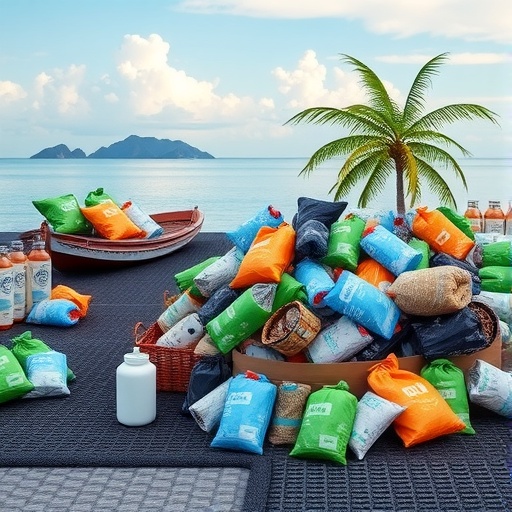In a groundbreaking study published in “Environmental Science and Pollution Research,” a team of researchers has unveiled a comprehensive waste management model tailored specifically for small island communities, using Koroipita, Fiji, as a vital case study. The pressing issue of waste management has become increasingly crucial for island communities globally, where limited space and resources complicate waste disposal and recycling. By addressing these unique challenges, the study aims to provide a sustainable framework that can be adapted and implemented in similar island environments.
Koroipita, a small community in Fiji, serves as an ideal representation of the challenges faced by many small islands around the world. Limited land space for landfills, intermittent waste collection services, and a lack of public awareness regarding waste segregation are common issues that threaten both the ecosystem and the local populace’s health. The researchers emphasize that without a structured approach to waste management, these communities risk facing severe environmental degradation, which can lead to broader implications for public health and tourism—two cornerstones of these economies.
One of the innovative aspects of the study is the introduction of an integrated waste management strategy designed specifically for the social and environmental contexts of small islands. The research team employed a combination of quantitative and qualitative methods, gathering data from both government sources and community inputs to identify the existing waste management practices in Koroipita. This thorough data collection process was paramount in establishing a foundation for an effective and culturally sensitive waste management model.
The proposed model incorporates various components, including waste reduction, recycling, composting, and energy recovery, making it a holistic approach to tackle the waste generated by the community. The researchers have highlighted that an effective model must account not only for the logistical aspects of waste management but also for the sociocultural dynamics of the community. Engaging local residents in the design and implementation phases of the model stands as a key element in ensuring its long-term effectiveness and sustainability.
One of the study’s focal points is community engagement, which is essential for fostering a sense of responsibility among residents regarding waste generation and management. By conducting workshops and educational programs, the researchers found that residents were more likely to adopt environmentally sound practices, such as proper waste segregation and increased participation in recycling programs. This proactive community involvement can significantly reduce the amount of waste that ends up in landfills, subsequently protecting the island’s natural beauty and enhancing the quality of life for its inhabitants.
Additionally, the study examines the economic implications associated with effective waste management practices. Currently, the disposal of waste in Koroipita and similar communities often incurs high costs due to the inefficient logistics involved, such as frequent collection services and vehicle maintenance. By decreasing waste generation through strategic practices, the community not only saves money but can also reinvest those savings into further environmental initiatives or community improvements.
In the environmental context, the negative ramifications of poor waste management practices in small island communities are profound. Landfills can leach toxins into the ocean, disrupt marine ecosystems, and contribute to increased greenhouse gas emissions. The researchers advocate that the adoption of the proposed waste management model can act as a preventive measure, significantly mitigating these adverse environmental impacts. Furthermore, through increased recycling and composting, communities can enhance soil quality and biodiversity, ensuring a healthier ecosystem.
The study also highlights the potential role of technology in enhancing waste management practices. By incorporating mobile applications and digital platforms, the researchers suggest that communities can streamline waste collection processes, improve communication with residents regarding waste schedules, and provide educational resources on sustainability practices. These technological advancements could empower communities to take charge of their waste management systems while significantly increasing participation rates.
As the research points out, an inherent challenge in developing waste management models for small communities is the need for adaptability. There is no one-size-fits-all solution; rather, each community must consider its specific circumstances, resources, and cultural beliefs. The authors emphasize that ongoing research and iterative processes are required to fine-tune local waste management strategies continually.
In conclusion, the study of Koroipita, Fiji, provides important insights into the development of a waste management model specifically catered to small island communities. By embracing a multifaceted approach that includes community engagement, technological integration, and sustainability principles, islands can pave the way toward a cleaner, greener future. This research not only sheds light on the severe challenges faced by these communities but also offers a blueprint for other small islands grappling with similar issues.
As the world becomes increasingly aware of environmental issues, the implications of these findings extend beyond the shores of Koroipita; they reverberate across countless communities that seek sustainable solutions to waste management challenges. The ongoing success of this initiative will be watched closely by researchers, policymakers, and community leaders alike, heralding a new era in environmental responsibility and community health.
Subject of Research: Development of waste management model for small island communities
Article Title: Development of waste management model for small island communities: a case study of Koroipita, Fiji.
Article References:
Prasad, R., Muna, L., Vodo, S. et al. Development of waste management model for small island communities: a case study of Koroipita, Fiji.
Environ Sci Pollut Res (2025). https://doi.org/10.1007/s11356-025-36876-5
Image Credits: AI Generated
DOI: 10.1007/s11356-025-36876-5
Keywords: Waste management, small island communities, Koroipita, Fiji, sustainability, recycling, community engagement, environmental impact, technology.




